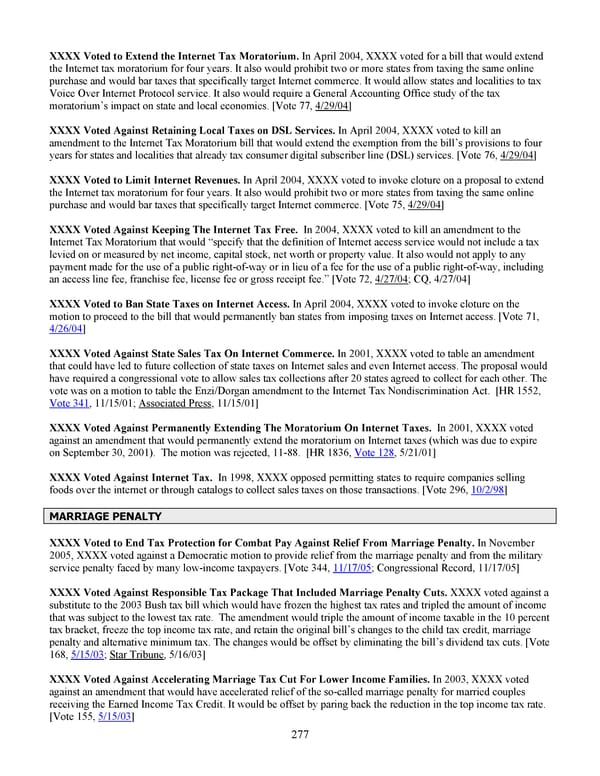XXXX Voted to Extend the Internet Tax Moratorium. In April 2004, XXXX voted for a bill that would extend the Internet tax moratorium for four years. It also would prohibit two or more states from taxing the same online purchase and would bar taxes that specifically target Internet commerce. It would allow states and localities to tax Voice Over Internet Protocol service. It also would require a General Accounting Office study of the tax moratorium’s impact on state and local economies. [Vote 77, 4/29/04] XXXX Voted Against Retaining Local Taxes on DSL Services. In April 2004, XXXX voted to kill an amendment to the Internet Tax Moratorium bill that would extend the exemption from the bill’s provisions to four years for states and localities that already tax consumer digital subscriber line (DSL) services. [Vote 76, 4/29/04] XXXX Voted to Limit Internet Revenues. In April 2004, XXXX voted to invoke cloture on a proposal to extend the Internet tax moratorium for four years. It also would prohibit two or more states from taxing the same online purchase and would bar taxes that specifically target Internet commerce. [Vote 75, 4/29/04] XXXX Voted Against Keeping The Internet Tax Free. In 2004, XXXX voted to kill an amendment to the Internet Tax Moratorium that would “specify that the definition of Internet access service would not include a tax levied on or measured by net income, capital stock, net worth or property value. It also would not apply to any payment made for the use of a public right-of-way or in lieu of a fee for the use of a public right-of-way, including an access line fee, franchise fee, license fee or gross receipt fee.” [Vote 72, 4/27/04; CQ, 4/27/04] XXXX Voted to Ban State Taxes on Internet Access. In April 2004, XXXX voted to invoke cloture on the motion to proceed to the bill that would permanently ban states from imposing taxes on Internet access. [Vote 71, 4/26/04] XXXX Voted Against State Sales Tax On Internet Commerce. In 2001, XXXX voted to table an amendment that could have led to future collection of state taxes on Internet sales and even Internet access. The proposal would have required a congressional vote to allow sales tax collections after 20 states agreed to collect for each other. The vote was on a motion to table the Enzi/Dorgan amendment to the Internet Tax Nondiscrimination Act. [HR 1552, Vote 341, 11/15/01; Associated Press, 11/15/01] XXXX Voted Against Permanently Extending The Moratorium On Internet Taxes. In 2001, XXXX voted against an amendment that would permanently extend the moratorium on Internet taxes (which was due to expire on September 30, 2001). The motion was rejected, 11-88. [HR 1836, Vote 128, 5/21/01] XXXX Voted Against Internet Tax. In 1998, XXXX opposed permitting states to require companies selling foods over the internet or through catalogs to collect sales taxes on those transactions. [Vote 296, 10/2/98] MARRIAGE PENALTY XXXX Voted to End Tax Protection for Combat Pay Against Relief From Marriage Penalty. In November 2005, XXXX voted against a Democratic motion to provide relief from the marriage penalty and from the military service penalty faced by many low-income taxpayers. [Vote 344, 11/17/05; Congressional Record, 11/17/05] XXXX Voted Against Responsible Tax Package That Included Marriage Penalty Cuts. XXXX voted against a substitute to the 2003 Bush tax bill which would have frozen the highest tax rates and tripled the amount of income that was subject to the lowest tax rate. The amendment would triple the amount of income taxable in the 10 percent tax bracket, freeze the top income tax rate, and retain the original bill’s changes to the child tax credit, marriage penalty and alternative minimum tax. The changes would be offset by eliminating the bill’s dividend tax cuts. [Vote 168, 5/15/03; Star Tribune, 5/16/03] XXXX Voted Against Accelerating Marriage Tax Cut For Lower Income Families. In 2003, XXXX voted against an amendment that would have accelerated relief of the so-called marriage penalty for married couples receiving the Earned Income Tax Credit. It would be offset by paring back the reduction in the top income tax rate. [Vote 155, 5/15/03] 277
 HRC vote skeleton Page 298 Page 300
HRC vote skeleton Page 298 Page 300